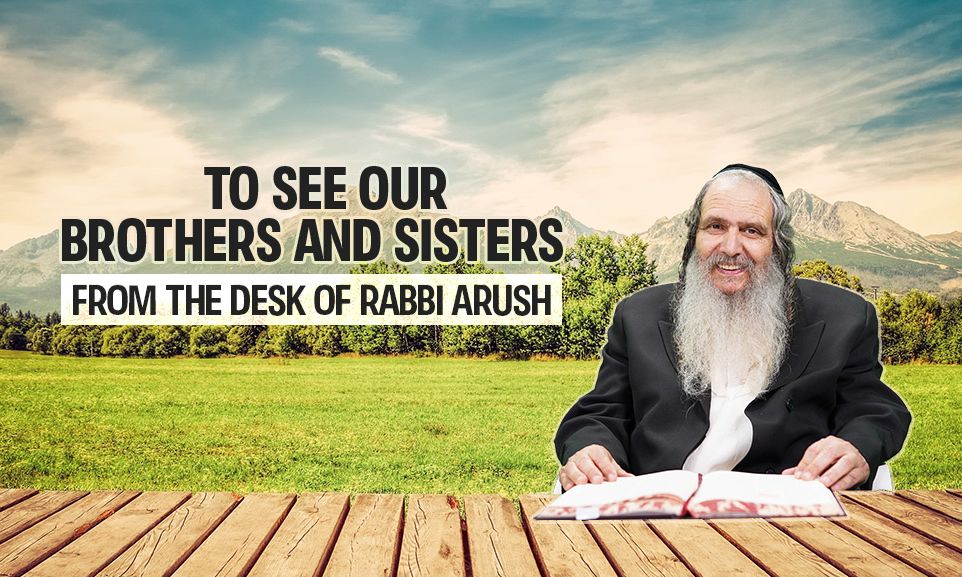
To See Our Brothers and Sisters
The Jewish people around the world are suffering deeply, either from the tragedies of the massacre and ensuing war, or from rising antisemitism. Who can remain indifferent – but what can we do? Rabbi Arush gives two ways to help our brothers.

Translated from Rabbi Arush’s feature article in the weekly Chut shel Chessed newsletter. The articles focus on his main message: “Loving others as yourself” and emuna.
Reb Chaim’s Approach
The rabbi didn’t expect to hear such a harsh response. He had been working for years on bringing peace to Jewish homes, and when he had a doubt, he would go to the holy home of Rabbi Chaim Kanievsky to ask him what to do.
This time too he shared the problem with Rabbi Chaim: The case was one of a talmid chacham, a learned person who gave halachic rulings, who was truly immersed in Torah day and night. And now his wife was asking him to take a few hours off from his learning to help her with the household tasks. But the illustrious talmid chacham was unwilling to do so. He was adamant that he had devoted his life to learning Torah, and he was giving up everything for the sake of that; his wife should take that into account. The issue was negatively affecting the atmosphere in the house.
Rabbi Chaim answered simply: “He should help her!” But the person asking persisted: “Kevod Harav, we’re talking about a ben Torah…” but Rabbi Chaim interrupted him and said: “He is indeed a talmid chacham, but he is not a ben Torah!” The rabbi asking the question was shocked by Rabbi Chaim’s unequivocal answer.
Suffering With the Public
A talmid chacham is someone who knows much Torah, but a ben Torah is someone whom the Torah has changed and affected his inner self. He has the middot (traits) of the Torah; he is sensitive to the needs of others and especially those of his wife. To know much Torah without becoming a better and more considerate person – that is a big problem.
To live according to the Torah and to be a ben Torah means to feel what is going on around you. To feel the pain of those around you and of course, the terrible and tremendous pain of Klal Yisrael – the Jewish People as a whole. During the war against Amalek, Moshe Rabbeinu sat on a stone and not on a chair or on pillows, because Bnei Yisrael were in trouble.
Chazal say that when the public is suffering and a person goes home and eats and drinks, remaining indifferent to the public’s anguish, then “The two ministering angels who accompany the person place their hands on his head and say, Ploni (meaning, this person) who has separated himself from the public will not witness the public’s consolation”; conversely, he who participates in the suffering of the public is promised that he “will merit to witness the public’s consolation.”
And so, the story is told about one of the luminaries of the generation, who, when there were wars in Israel, would not sleep in his bed, but rather on the floor, because he said that “When soldiers are lying outside in the cold and fear, and they have neither day nor night – how could I lie in my bed peacefully?!”
Defining Darkness
One can find a hint to this in our parasha. When the Torah describes the Plague of Darkness, it says, “They didn’t see one another.” And the question is asked, why did the Torah choose this phrase of all other phrases? After all, they didn’t see anything, so obviously they didn’t see one another. What is this emphasis on that they didn’t see “one another”?
But the Torah is hinting here at a fundamental thing in life: The greatest darkness is when people don’t see one another, when people ignore and are indifferent to the other’s distress. Such a society is always in darkness.
But bnei Yisrael did see one another, and that is why they had light. The Jewish shotrim (foremen in Egypt) who were willing to receive lashes because they had pity on their brethren; Moshe Rabbeinu who was chosen to be the leader because of his great feelings of mercy towards his brethren, as Rashi interprets the passuk of “Moshe… went out to his brothers and saw their suffering” – “He turned his eyes and his heart to feel sorrow for them.” And he killed the Egyptian and endangered himself because he had pity on his beaten brother. Despite the fact of his living in luxury in the king’s palace, he did not ignore a Jew’s distress.
Chazal say, “He would see their suffering and cry and say, pity on you; I wish I could die for you, for there is no work more difficult than the work with mortar. And he would put his shoulders forward and help every one of them.” In the merit of this, “The Holy One, Blessed Be He, said, ‘You left your own dealings and went to see Yisrael’s distress, and treated them like brothers, I will leave the upper worlds and the lower worlds, and will speak with you.’”
I Am with Him in His Troubles
And now we are in a situation in which tens of thousands of our dear soldiers are endangering their lives every moment, and living in difficult conditions, in fear and in danger. Their parents and wives at home do not sleep, so fearful and troubled are they, and every time there is a knock at the door or the telephone rings, their hearts skip many beats. How can we sleep calmly? How can we not think of every soldier as if he is our very own son?
And that is besides our hostages, and the thousands of bereaved families and those who suffered during the terrible massacre, and the tens of thousands of families who were forced out of their homes [Editor: along the Lebanese border and near the Gazan envelope] and have been living in exile for months already [Editor: they have been displaced to cities in the center of the country].
What can we do? First, feel the sorrow of the Jewish People. Don’t be disconnected. Don’t be indifferent, chas veshalom. “I am with him in his troubles”. To think of our brethren and pray for them from the depths of our hearts, to pray for every soldier as if he is our only son. The light of the Jewish People is our mutual responsibility for one another. We are all “children of one man”. We are all limbs in one body. When one limb hurts – the whole body hurts.
Think about the fact that for a while already we’ve been hearing every day about the number of soldiers killed. Every day, families in Israel receive the terrible news, and their lives change forever. Every day there are more bereaved parents, more widows and orphans, more women pregnant with children who will never know their father. Young men who lose their hands or legs. How can one sit in peace? We must not remain silent!
Thorough Treatment
We must shout and shake the heavens and do everything for the dear families. Pray for each soldier, the recovery of the wounded, console the families, visit the soldiers and empower them.
And the main, main thing is to pray repeatedly and wholeheartedly and beseech Hashem regarding the purpose of the world. Not only that soldiers won’t die, but that there should be such daat (understanding) in the world that there will be no more wars; that there should be such daat of Geula, that the whole world will believe in Hashem and the prophecies will come true:
Nation shall not raise sword against nation; no more will they learn to make war… they shall beat their swords into plowshares, their spears into pruning hooks…. (Isaiah 2:4) Wolf will lie down beside the lamb… There will be no wrong or violence on all my holy mountain, for knowledge of Hashem will fill the earth as waters cover the ocean. (Isaiah 11:6, 9)
This will happen only because of our praying to Hashem and insisting that He bring us the complete Geula, when only He, yitbarach, will rule over us, and His kingship will be revealed throughout the world. We should pray that He will build the Beit HaMikdash (Temple) for us, which will be a house of prayer for all nations, and that Mashiach will come and spread wonderful daat among all the Jewish people and all creatures.
As One Man
Chazal say further, that during the Plague of Darkness, many Jews died because they were not worthy of redemption. But now, in the complete Geula whose light we will see soon, we don’t want to leave anyone behind.
There are no wicked people among the Jewish people. They are all simply tinokot shenishbu – babes who were taken captive – who don’t know the difference between right and left, and who never tasted the sweetness of Judaism. No one does any wrong intentionally. No – they are all tzaddikim and kadoshim who are willing to die for the sake of their brethren. All are suffering together in the Land of Israel from persecutions and disturbances only because they are Jews.
Therefore, we must call out to Hashem about the distress of every Jew, be it bodily distress or emotional distress, and also about the distress of the entire people. We must call out to Hashem so that He will end this long exile and bring us the complete Geula with mercy. And when praying for the Geula we must insist that each and every Jew merit it. We’re not leaving anyone behind.


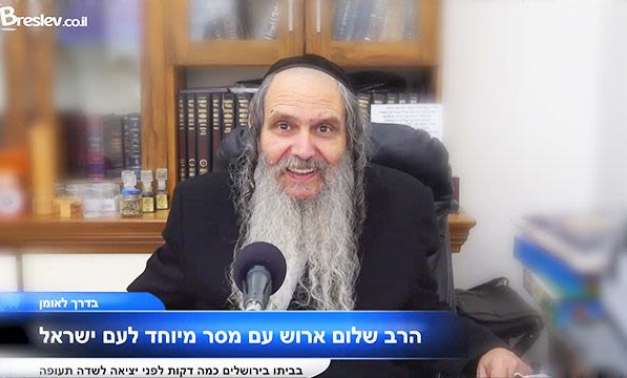

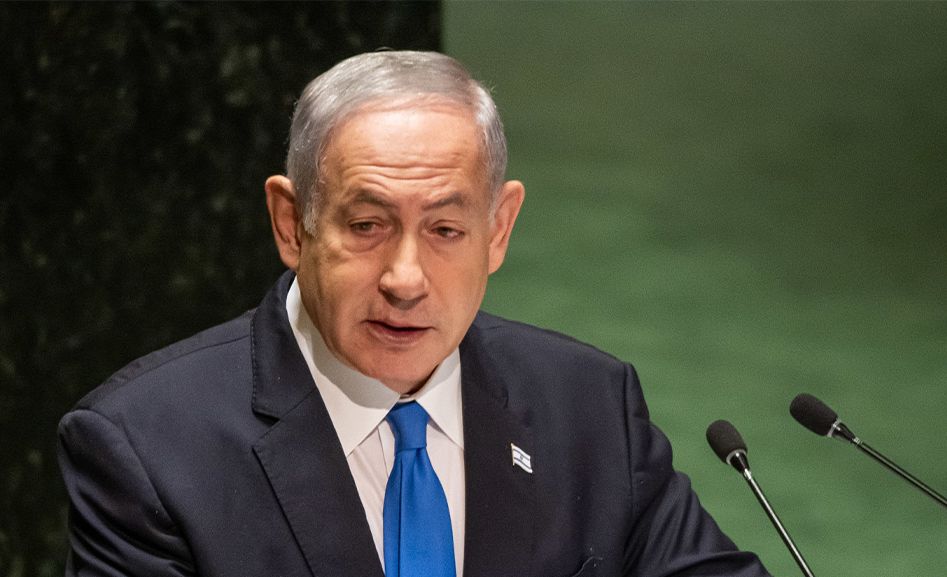
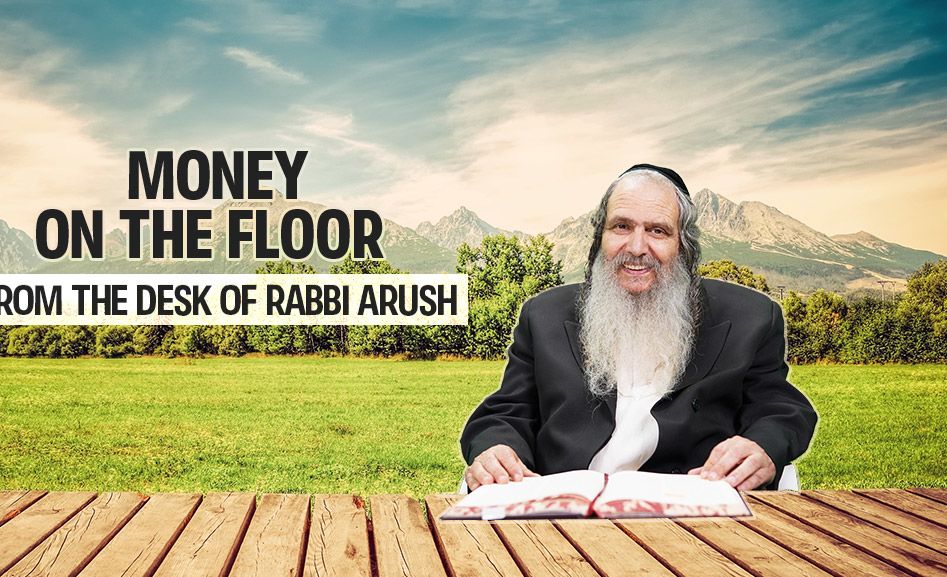
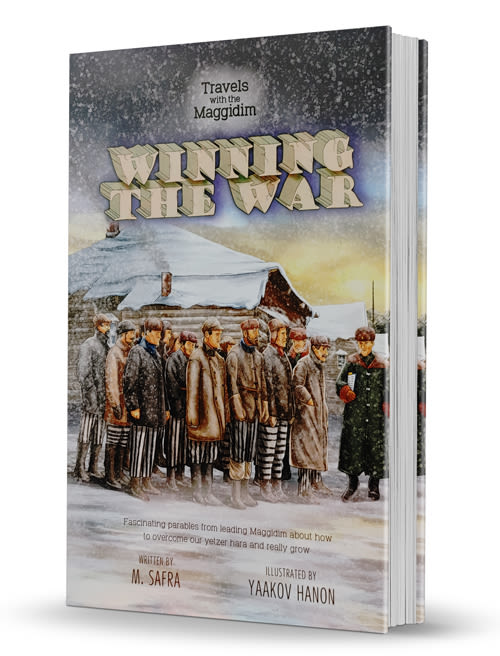
Tell us what you think!
Thank you for your comment!
It will be published after approval by the Editor.